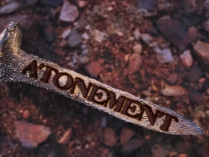 Reflecting on the New Covenant Model
Reflecting on the New Covenant Model
Gorman does not seek to explain how the cross brings forgiveness. Rather, his goal is to explain that the cross brings much, much more. He wants to teach what the atonement is more than how it comes into effect.
And he effectively argues that the cross brings about far more than mere forgiveness. It’s about far more than attaining heaven. That’s not to dismiss or minimize these things so much as to avoid the temptation to reduce Christianity to getting saved or how to get to heaven when we die.
He insists that the cross and atonement produce —
the creation of a covenant community of forgiven and reconciled disciples, inhabited and empowered by the Spirit to embody a new covenant spirituality of cruciform loyalty to God and love for others, thereby participating in the life of God and in God’s forgiving, reconciling, and covenanting mission to the world.
Amen. We would do very well to balance our teaching by including these elements.
Just to take an example, what do Calvinism and Arminianism say about these various elements? They speak extensively about how to get saved and how to make it to heaven, but say precious little about the rest. They are therefore not complete theories of atonement. They are not true systematic theologies. They’ve focused on one or two very narrow (important, but narrow) questions, and yet they divide the Protestant world and have done so for centuries.
A broader, healthier view of the atonement would make these (and many other) competing theories less important because we’d see the questions they seek to answer as less important (important but not all encompassing).
Moreover, a more balanced, comprehensive understanding of the atonement would prevent some of the errors made in the name of both views. In the case of Calvinism, the notion that how one lives is irrelevant to one’s salvation (not taught by most but certainly taught by some) would be laughed out of the discussion. In the case of Arminianism, the notion that some have that we’re damned for every sin until we repent of that sin would be considered equally absurd.
You only reach such ridiculous conclusions by restricting your studies to the proof texts for your favorite position — and a broader, more balanced view of the atonement would do much to assure that our preachers and leaders know much, much more about their Bibles.
How would Church of Christ theology have changed in the 20th Century had our teachings addressed all the elements of the atonement found in the New Covenant Model of atonement?
Well, our theology was so far removed from this model that we could barely have had a conversation! After all, we denied that the Holy Spirt was still active in our lives. We denied salvation by faith in nearly every way that matters. And we ignored the verses on which this model is built. Indeed, we did all we could do to avoid Romans and Galatians.





“In the case of Calvinism, the notion that how one lives is irrelevant to one’s salvation …In the case of Arminianism, the notion that some have that we’re damned for every sin until we repent of that sin would be considered equally absurd. You only reach such ridiculous conclusions by restricting your studies to the proof texts for your favorite position”
You arrive at that conclusion by seeing salvation/damnation as LEGAL states. That is the true “legalism” and the more faith-onlyist a person is, the more guilty they are of it.
I am not a theologian, so I would not attempt to discuss the cross in text book terms. That is not a criticism of Gorman; his description of what the cross and atonement produce is stated very well. What I do, I believe, is bring things down to earth, sometimes, I hope, in the most human way I know.
What I see in the cross is our recognition of who we all are, children of God, and in that recognition is any weight or any burden we must carry, any wound we must cover, any disease we must touch, any embracing of those people that others around us consider less human or as filth . This is the cross; not our shallow, legal moral codes. While being a child of God knows how and when to say “no” to ourselves, “not doing” actually comes very easy to many and requires no suffering at all. What the CROSS actually says is “Its not supposed to be easy”; that it does not matter what you do not do if you cannot look on the “different, the diseased and the foul” and see Christ.
Those who can see Christ around them and carry the burden that Jesus carried through every healing of every disease he touched, through every breaking of bread with the outcast, will be the new community and covenant that the world will not fail to see.